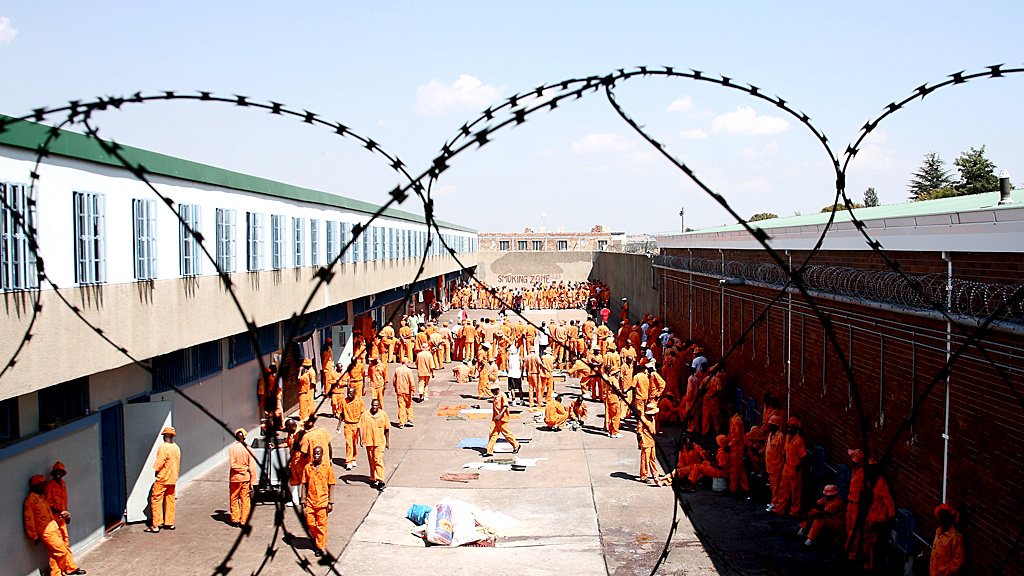What could life be like in prison for Oscar Pistorius?
Oscar Pistorius is found guilty of the manslaughter of his girlfriend Reeva Steenkamp and now faces up to 15 years in prison – but what fate lies ahead for the Blade Runner behind bars?

According to legal experts Pistorius will most likely be sent to a state facility such as Pretoria Central Prison, Baviaanspoort on the outskirts of the city, or Zonderwater, in the countryside to the north.
Nooshin Erfani-Ghadimi, from Wits University in Johannesburg’s Justice Project, told the Telegraph that the authorities would be careful not to be seen to be giving Pistorius special privileges.
Luxuries including single cells, special food and access to televisions and laptops are usually available unofficially to prisoners with money in South Africa, but the public interest in the case could work against him.
She said: “If he was a normal wealthy prisoner he would probably be able to tap into that but because he is high profile it might that he has less of a chance because of that same scrutiny.”
‘Overcrowded’
If Pistorius were not to receive special treatment, he could end up in one of South Africa’s many overcrowded prisons. According to the World Prison Brief (WPB), an estimated 157,000 people are behind bars in South Africa, including pre-trial detainees and remand prisoners.
In August, Minister of Justice and Correctional Services Michael Masutha expressed concerns after visiting Grootvlei and Mangaung maximum prisons in Bloemfontein, Free State: “We are over 30,000 crowded nationally at the moment and we are dealing with that situation on how to reduce the number. The limited number is 120,000 of the inmates but we are over 150,000.”
The notorious Pretoria Central Prison has a reputation of being one of the toughest in South Africa. Here dozens of political dissidents were detained and executed by the white-minority regime that ran South Africa until 1994.
In 2013 a paraplegic detainee on remand - as reported by the Guardian - described what life was like for disabled prisoners in South Africa:
"If I use my [crutches] I have to pull my legs and throw them to the front. That's how I walk. I was shot in my spinal cord, which was cut in the middle during a hijacking in the driveway of my house three years before my arrest. Before I was transferred here I was in Johannesburg prison, where the doctor prescribed a wheelchair for me. The doctor here says I must get a wheelchair from an outside hospital but hasn't referred me.
"Living here is very hard. We are 88 men in this cell which is meant for 32. Sometimes there are more. Twelve people sleep in two bunks pushed together, that's six on the top and six on the bottom. I have my own bed on the bottom, which is a privilege. Luckily, I don't have to share because of my medical status.
"There are eight or 10 people with TB in this cell and four or five we know are HIV-positive. A guy with multi-drug resistant TB sleeps on top of me. I feel vulnerable all the time. Not because I'm threatened physically but because I'm always called names and treated like an alien. I'd rather die than be here."
South Africa has since abolished the death penalty but the prison’s reputation remains – the permanent, overcrowded home of armed robbers, rapists and murderers, plagued by gang violence and mental and physical abuse.
For 23 hours a day, prisoners are kept 70 or more to a cell designed for 35, with those unable to get a bed sleeping on the floor.
‘Torture’
In October 2013 staff at one of South Africa’s most dangerous prisons, run by British firm G4S, were accused of “shocking” abuses and of losing control.
The South African government temporarily took over the running of Mangaung prison and launched an official investigation following the dismissal of 326 employees by G4S. But operations were handed back to G4S in August 2014, following the investigation.
“As a department, we are satisfied that the issues that led to our takeover of the Mangaung Correctional Centre have been resolved and we will continue to work with G4S to ensure a phased handover and operation of the facility,” a government official said.
As part of the resolution of the dispute, G4S agreed to re-employ all 326 dismissed employees with full recognition of years of service and seniority, subject to relevant disciplinary measures where they are applicable.
‘Human rights’
A US human rights report in 2013 found that many of the 242 operational prisons in South Africa did not meet international standards.
Many prisoners had less than 13 square feet in which to eat, sleep, and spend 23 hours a day. To reduce overcrowding the government transferred prisoners to facilities that were not at capacity.
In some prisons overcrowding and poor living conditions, including lack of ventilation, contributed to the spread of disease, particularly tuberculosis and HIV/Aids, the report found.